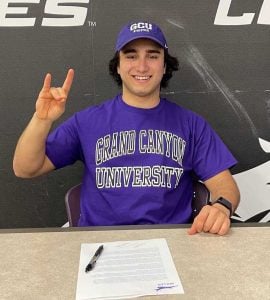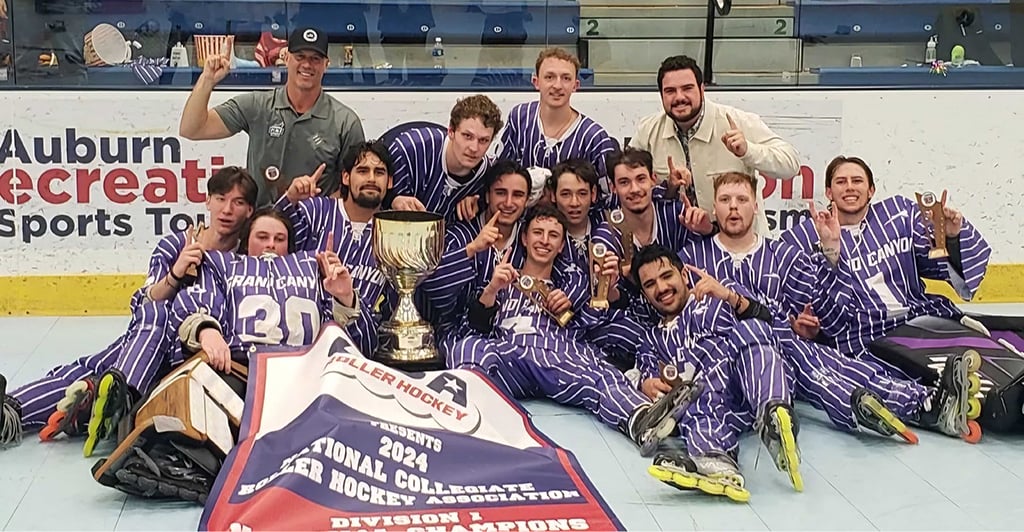PEORIA – Dissatisfied with limited playing time for one of the nation’s top collegiate roller hockey teams, Aydin Schwetz had no choice but to start his own program that would eventually go on to match the success of his former team.
Since its Division I debut in 2022, Grand Canyon University has established one of the nation’s premier roller hockey programs in the National Collegiate Roller Hockey Association. However, Schwetz didn’t always plan to establish a new program at GCU.
His NCRHA career began at Arizona State University but was cut short due to the COVID-19 pandemic. He transferred to one of the NCRHA’s best collegiate roller hockey teams at Lindenwood University, where he appeared in 24 games in two seasons.
Schwetz made quite the impact in a limited role, netting 42 goals, 22 assists and 64 total points. His efforts would help the team win a national championship in 2021-22. Despite his impressive performance, he grew dissatisfied with his standing on the team.
“While I was there, I just didn’t feel like I was being given a whole lot of opportunity or at least the amount of opportunity,” Schwetz said.
After some tough conversations, Schwetz decided to part ways with Lindenwood and set out to begin a new chapter in his roller hockey career. Using his experience in the sport as guidance, the Thousand Oaks, California native formed and designed a program at GCU. Before stepping into his current role as the director of operations, he played forward and served as the team’s president in his only two years on the roster.
“There was nowhere upwards to go from Lindenwood. There wasn’t a better situation anywhere. So I decided to start the program at GCU and create a situation in which I was happy with what my collegiate roller hockey experience was going to be,” Schwetz said.
Building a new program from scratch to compete at the Division I level is no easy task. Without any scholarships to offer or financial support from GCU, the club relied on its players to fund the team’s expenses, including player fees and travel expenses.

Aydin Schwetz finds a fresh start with the GCU roller hockey team, eventually leading the Lopes to an NCRHA Division I national title. (Photo courtesy of NCRHA)
“We charge a team fee of $2,000 per player, but the reality is that our season really costs closer to like $3,500 to $3,800 per player. We do a lot of fundraising; a lot of donors. That’s really how we get by,” Schwetz said.
While other Division I programs in the NCRHA offered players scholarships, GCU struggled more than other schools to recruit players.
“People want to go to those schools and get a scholarship to play,” GCU defenseman Brock Lefever said about the importance of scholarships. “Players go to other schools and don’t get that, so you have to pay to play. It makes it a lot more difficult for people like GCU to get players.”
Schwetz spent months cold-calling players to recruit and form a talented roster before the 2022-23 season. With his persistence, he managed to sign a roster of 10 skaters and two goaltenders before the start of the season. However, his team began to fall apart.
“I was just cold calling. … 8-10 hours a day the entire summer,” Schwetz said. “About two weeks before the season started, we had eight to 10 skaters and two goalies. I had six skaters and both goalies all bailed on me at the same time, two weeks before school started.”
Without a goaltender to play to start the season, Schwetz reached out to a long-time friend, Jay Pacheco to play in the net.
“I’ve been playing against Jay (Pacheco) since I was four years old, we are from the same area. I actually got him to quit welding school, right after his certification and come play college roller (hockey),” Schwetz said with a laugh. “And now I actually don’t think he’s even going to go back to welding school.”
Despite the challenges of building the program, GCU finished its first season with a winning record (15-11-0-2). As the doors closed on their inaugural season, the program took a major step heading into its second season.
Building on the lessons learned from their inaugural season, the team faced new challenges as they entered their second year for the 2023-24 season. The Division I teams in the NCRHA featured some of roller hockey’s premier talent, presenting a daunting challenge, as GCU still faced challenges with parts of the team lacking roller hockey experience.
“A lot of players on this team have never played college roller before. We had a huge disparity between the two halves of the team,” Schwetz said. “We had a player who didn’t even own a hockey bag when the season started. We had players who had never played competitive roller when the season started.”
However, GCU remained unshaken, setting the bar high to begin the season to reach the national championship game. That season, Schwetz would impose upon his players that hard work and belief can overcome even the most daunting challenges.
“When you put your head down and you create something where everyone really cares, and you care a lot more than anybody else that you’re playing, then good things are bound to happen,” Schwetz said.
GCU went on to top its inaugural season with a 17-1-0-2 regular-season record and carried that momentum into the playoffs, sweeping Arizona State University to capture the Western Conference championship.
With GCU continuing to ride out an impressive season, the Lopes’ win over ASU earned them a bid to compete at the NCRHA national championships in Auburn, Maine.
“When you win the Western Conference championship, you’re like alright, let’s keep the winning going. Let’s keep it going and take down another battle; keep climbing the hill in any way you can,” Lefever said.
Concerned about his team’s play heading into the national championships, Schwetz felt the team needed to pause and regroup.
“As a manager, I took a step back, and it was like, we have too big of heads. Our egos are too large. What if we don’t do anything between now and nationals? It’s going to be really bad because there’s a lot of players on this team, not only have they never played college roller before, but they’ve never even played high-level roller hockey,” Schwetz said.

GCU roller hockey celebrates its shocking 2-1 triple overtime victory against Lindenwood in the 2024 NCRHA Division I national championship game. (Photo courtesy of NCRHA)
GCU finished round-robin play 3-1, suffering its only loss against Lindenwood. The Lopes faced Bethel University in the semifinals, where they prevailed to win 2-1 in overtime to earn a national championship berth.
However, they would be lined up again against Lindenwood, the two-time defending champions.
“Coming off of that semifinal win (against Bethal), we were ecstatic. That was our final goal. We had completed everything we had set out to do this year – and more. So honestly, we were walking into this game, just wanting to have fun,” Schwetz said.
Heading into the national championship game, Lindenwood pitched a perfect 21-0-0 record as the team to beat in the NCRHA postseason. To prepare for the biggest game in program history, GCU sought out inspiration from “Miracle on Ice,” a team of American college hockey players who pulled off one of the greatest upsets in history when they stunned the Soviet Union 4-3 at the 1980 Olympic Games.
“Leading up to it, we were there for I think six days and we watched the Miracle like seven times. So after every game, we were getting in that moment of hey, we could actually make something happen here,” Pacheco said.
Schwetz knew his team was outmatched in just about every aspect on paper against Lindenwood, but he focused on the one area he knew he could control: the team’s mindset.
“The reality is Lindenwood was bigger than us. They were faster than us. They had more skaters than us. They had more wins than us. They had about 300,000 more dollars than us. They had everything. They rolled in a coach bus to the game into the tournaments,” Schwetz said. “They had everything more than us. But they did not care more than we did, and that was what I wanted to make sure that we had the mindset going into that game.”
In their final game of the season, the Lopes did the unthinkable and defeated Lindenwood University 2-1 in triple overtime. Despite being outshot 55-20, Dylan Guy scored on GCU’s first shot in overtime, a goal that left the players and spectators in shock.
“People froze when we scored, they got excited, but everyone was supposed to throw their stuff, all their gear, you just throw it. But everyone was like, did we just do that? Everyone was so surprised by what had just happened. So it was more of a shock,” Lefever said.
GCU completed the season-long mission to secure the program’s first national championship and finished the season 25-2-0-2. Still, Schwetz says, the title was unexpected despite the team’s pursuit since the first practice.
“We definitely were not anticipating going and winning a national championship just two years into our existence, that was more of a 10-year goal,” Schwetz said.
With the accelerated growth the program has seen over two seasons, the players will continue to lay the foundation for years to come. GCU will look to defend its title in October, when the 2024-25 season begins.
“We set the bar pretty high and I think it’s going to stay high. I think we are going to keep the whole ‘everyone has to buy in’, keep our same little traditions that we have,” Lefever said. “I guess it’s going to be to do the same thing every year. Win a Western Conference championship, go to nationals and get at least to the national championship game.”
